#mori meta
Text
Absolutely obsessed with Mori's ability to always make himself out to be the lesser evil. Like his power and influence is entirely derived from him being in an objective position where he can say "sure I'm bad, but I'm not as bad as that guy".
He repeatedly teams up with Fukuzawa in their backstory because he might be awful but "at least they both want to protect the city". He kills the old boss but assures the mafia's loyalty over time because "at least he's being rational and not indiscriminately murdering out of paranoia". He's the leader of the most dangerous criminal group in Yokohama but "at least he's doing this under Natsume's direction". "At least he's not Mimic". "At least he's not The Guild". "At least he's not The Hunting Dogs".
It puts a lot of people in this very awkward position because the truth is that he's not just saying he's the better option, he's framed and manipulated the situation in such a way that he genuinely is. And this approach is largely successful.
He gets the ADA's cooperation in the Guild arc
He earns Kouyou's loyalty by being a better boss than the old boss
He earns Chuuya's loyalty by being a better leader with advice to give (also by having the mafia be Chuuya's only home at this point, but that's not related to this post)
He gets the ability user permit by literally just not being Mimic and promising to deal with the situation
Most of the people in the mafia are loyal because as tough as it is at least they're not back on the streets or in the slums or wherever they came from originally
Puts Fukuzawa into this terrible, no-good situation where the mafia is quite literally the ADA's best choice for getting away from the hunting dogs - and he gets to demand what he wants in return
He almost always gets what he wants in return. It doesn't matter if people see though it because he's made himself the best option in an awful scenario. There's been a few times where this has backfired: he lost Dazai in the Mimic incident because he, once again, assumed Dazai thought exactly like him (he doesn't), and in Yosano's backstory, where framing himself as the lesser evil to the enemy wasn't enough because he was the only one in direct contact with her. For the most part, however, this seems to work out for him and it allows him to seize power, gain favours, inspire loyalty and just generally be a really canny leader.
It's absolutely awful. It's absolutely brilliant. In fact, I think it's got a similar premise to that one sales tactic (can't remember the name) where you suggest a stupidly high price and then barter it down to a "better deal" but the better deal was actually just the original price of the thing you were trying to sell and you intended to sell it at that price from the beginning. That's what this feels like, except he barters situations.
How do you do it murder man? Tell me how you keep doing this.
#bsd#bsd meta#bsd analysis#bsd mori#mori meta#mori is awful#but he's a good leader for almost exactly this reason#his genius power is to make literally any situation work for him lol#it's going to drive me crazy that i can't remember the name of that sales tactic...#like i know it's a framing effect but it has a name what is it???#anyways#bsd spoilers#storyrambles
871 notes
·
View notes
Text

hoshikawa has done such an incredible job of portraying Dazai from Chuuya’s perspective… back before he figured out that Dazai’s demon persona was just that… a persona. an act


before he learned to see through Dazai’s fronts
Dazai made people think he was uncaring & heartless, when this was his intention all along (he does this in Stormbringer & Dead Apple too)

Chuuya sees Dazai manipulating him…


but he doesn’t see that Mori is manipulating Dazai




“I do it all for the organization and the protection of this beloved city.” —Mori
#i heard someone say that Dazai at this age was basically just parroting Mori & i think that’s such a good way to look at it#this chapter is so so good wow. hskw does it again#rambling about bsd again#bsd#bungou stray dogs#skk#soukoku#bsd dazai#bsd chuuya#dazai osamu#nakahara chuuya#bsd mori#mori ougai#bsd meta#bsd analysis#bsd fifteen manga#bsd fifteen#bsd fifteen spoilers#bsd 15 phase 21#bsd spoilers#bsd 15 manga#shiwasu hoshikawa
790 notes
·
View notes
Text
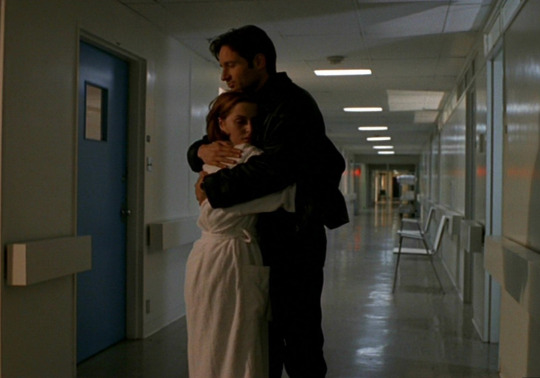
Rewatching memento mori and the fact this scene can be read as a symbolic wedding lives rent free in my head:
Mulder waits for Scully to walk up to him. She's in a white gown and he's all in black. There is a re-statement of vows and willingness to go on together. There was supposed to be a kiss at the end.
Rent Free, I tell you
463 notes
·
View notes
Text
We don't talk enough about the fact that RIGHT after Memento Mori we get an episode where a woman's fiance is killed and she loves him so much she literally brings (a version of) him back to life.
He died shortly before their wedding, and in the end she performs the ceremony with him and then releases his "soul" and mourns him. Scully and Mulder witness most of it.
I already mentioned the parallels to DeadAlive at some point:


But when you compare Kaddish to Memento Mori the similarities are practically screaming at you. The title itself refers to a Jewish prayer of mourning and fits perfectly.
Not only is the colour scheme the same just reversed, the actions and their positioning mirror each other too. Add to that the fact that these are Jewish traditions and thus by extension Mulder's traditions and you have a vortex of pain.
The woman's father even says that she tried to bring him back with her love—but he's merely a husk, a dead man walking. I think you could say that Scully is already a dead woman walking at this point, though by Redux it's quite literal. They both know that, they both were forced to confront it at the hospital, they are both aware that there's a timer looming above them as it ticks and ticks.
Mulder and Arial cannot accept reality, so they fight it with their beliefs. Belief in the truth, in God and her traditions, it all comes down to a matter of faith.
Here are some comparisons of what I consider to be the most important shots/parallels.


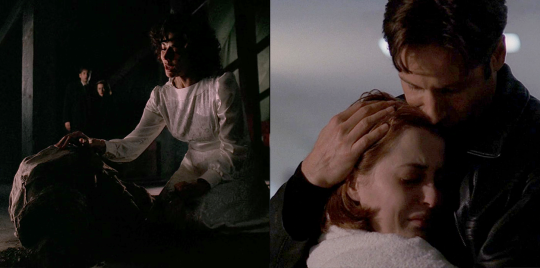
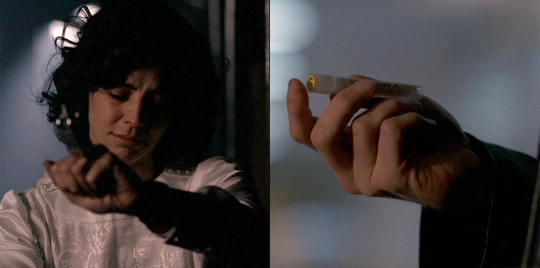
My favourite part, however, is the ending.
Scully shows up and helps Mulder back on his feet (he got knocked down by said semi-revived now-husband) and then asks him about what's happening.
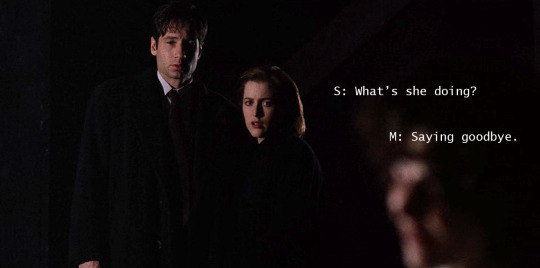
Saying Goodbye.
We get a wonderful shot of Mulder's face as he says it, and oh look it's familiar devastation and grief! From the moment he learns about her diagnosis, Mulder is both preemptively grieving her and simultaneously refusing to accept any of it. No matter how far he tries to run from it, he'd never run from Scully and thus cannot escape her equally inescapable death sentence.
Arial had to accept the death of Isaac and Mulder has to accept Scully's fate.

Without wanting to, Mulder is already beginning to say goodbye and preparing himself for the loss he knows will destroy him. Everything Mulder does, from looking for a cure to celebrating her birthday because it might be her last, is his personal song of mourning—his prayer directed at everyone and no one.

He invented wishing her back to life and did it over and over again, however many times it takes; he needs her more than he needs to breathe.
#alex watches x files#txf#the x files#x files#dana scully#fox mulder#scully x mulder#mulder x scully#msr#txf meta#msr meta#txf memento mori#txf kaddish#txf cancer arc
166 notes
·
View notes
Text
"My Touchstone": the Turning Point

Dedicated to the anon who asked:
I would love to hear your thoughts on how the “touchstone” conversation changed Mulder and Scully’s relationship. Was it this scene that propelled them into a romantic relationship?
To answer that question, I have to back up a bit to Fight the Future. Actually, let's back up even further-- to the cancer arc-- so we can get a clearer picture of the relationship between these two Avoidants (post here.)
FORWARD AND BACKWARD

Mulder realizes the extent of his feelings for Scully in Memento Mori.
I posit Scully's already known her feelings since at least early Season 2; but her temperament leads her to suppress, rather than express, emotional wants or needs. Never Again (posts here and here) was the result of both Season 3's on-and-off jealousy and Mulder's avoidance of a normal life (Home, post here) and search for his tragic soulmate (The Field Where I Died.) Because of this, Scully tries to pinpoint and grapple with her "endless line", realizing-- too late-- that she wanted recognition (and more) from Mulder (as spelled out in the script, here.) Mulder realizes this, too, and lets the matter drop.
For Scully, it's advantageous to keep everything unsaid, largely because Mulder isn't ready... for anything, really (as discussed in the Home post linked above, and demonstrated by this clip.) Everything he's been drawn to or attracted by has an ephemeral, fleeting resemblance to some other normalcy he craves (post here)-- but has never, ever lasted. Except Scully.
So, Mulder realizes his feelings, Scully escapes cancer by the skin of her teeth, and we arrive at Detour... where he runs from the motel, chasing after his monster case.
Some read this moment as Mulder realizing and dodging Scully's intentions, others that he was completely blind to her intentions. I file it as the latter; but we also have ample evidence of Mulder noticing Scully's actions briefly before losing focus in favor of another tantalizing mystery (ex. the beginning of The Unnatural.) He misses the forest for the trees in his personal life-- or rather, he doesn't see the value in fixating on it beyond a few superficial check-ins here and there (we'll get to that.) Scully's always by his side, they have the work, he wants answers, why change? It's the same question he asks her in other contexts (ex. "Why now? Why Boggs?" in Beyond the Sea.)
Season 5 continues. It's a rough year for Mulder (post here.) And for Scully: The End is another episode on a pile of episodes where she feels she's "failed" Mulder, leading to her dispirited goodbye in FTF.
Thus, we arrive at Fight the Future: the moment that forces Mulder to make a confession or lose Scully. To him, her importance was never in question; but the hard part is admitting how broken he feels without her. He was afraid to do more in their partnership because... what would happen if things changed? His fear is rooted in the "What if?", and holds him back from a course of action. Scully's fear is rooted in "Did I choose right?", and manifests after she decides on a course of action (A Christmas Carol's doubts after joining the FBI, Never Again after four years in, all things after the Season of Secret Sex, etc.)
Despite the good that came from his hallway, Mulder's greatest fear is realized when Scully nearly dies after he confesses he needs her. This kicks him into retreat mode (post here)-- "go be a doctor", he tells her. It's Scully who says, "I can't", and clings to his hand, who refuses to give up. That is important, because it's another example of how reliant on Scully Mulder is, to the detriment of his own growth, at times.
Mulder takes her words to mean that Scully is unflinchingly by his side-- which is true. What isn't is his next assumption: that they're on the same page.
They're not, really.
THE IMPORTANCE OF SEASON 6

In The Beginning, Scully hasn't felt the need to change-- she's a scientist, she needs proof-- but she hasn't confronted and overcome her unnecessary doubts, either. Mulder, meanwhile, demonstrates he hasn't changed, either-- and, more importantly, how far removed he is still if from a functioning relationship... as Scully suspected. Hurt that she didn't back him up before their superiors-- which resulted in them losing the files-- he hides behind frustration and anger. Scully feels rejected, and lo and behold! Diana appears; and wins back some ground with Mulder while Scully loses Gibson Praise. By the end of the episode, Mulder doesn't want to cosign to Scully's theory because her science, he thinks, betrayed them before. And lo and behold! It kind of did. But it didn't this time, when it's too late.
Where does that place them early Season 6? As an enclosed unit, with Mulder pillaging the basement-- without consulting Diana-- and sneaking off on his own or taking Scully with him on his misadventures. For all that could be wrong between them, a lot is still right; and both put in the effort to include and watch out for the each other.
Then Two Fathers and One Son (posts here, here, and here) shakes them apart: Mulder doesn't want to believe yet another ally is using and manipulating him; but gives in and goes to investigate Diana when Scully threatens to walk if he doesn't listen to her. He's speared in the Achilles Heel, however-- fatalism in the face of the inevitable-- and almost gives up completely before Scully yells him back from the brink. This happens again in Amor Fati; but he finally learns his lesson there. Scully is visibly angry with him at the end of the episode... and then we have the next few episodes as if nothing happened.
Agua Mala completely resolves their festering from One Son (yes, it's a blink-and-you'll-miss-it resolution; and, yes, I need to sit down and write that out sometime) and propels them into their old-- dare I say, lighthearted-- routine and banter (i.e. Monday, Arcadia, etc.)
An important side note: To accurately place where Mulder and Scully were romantically during this period, we have to figure out if there was lingering tension post One Son. The facts simply don't support that narrative. We see in Arcadia that Scully was enjoying herself at first-- only brushing Mulder off initially when he used her as part of his schmaltzy facade (during their arrival)-- until her partner began poking at her, too (posts here), to maintain distance between them (post here.) We see in Alpha (posts here) that their banter was fun and lighthearted until she found out Mulder kept information relevant to that case from her; and that that information was yet another woman he wanted her to trust without question because he did. (Regardless, she still looked out for his best interests and sympathized with him after Karin's death.) We are shown in Milagro (posts here) that her tops are dropping lower and lower in an unconscious desire to grab Mulder's attention; but more importantly, that Mulder still hasn't considered her in all the ways Dana Katherine Scully exists. Yet, tension only arises when Scully feels overlooked, not displaced-- a creeping of her old assumptions and Mulder's missed signals in Never Again 2.0, not a minimization of her value ala One Son. We see in The Unnatural that she's survived Padgett and is setting subtlety aside for the first time in their relationship; so no tension there at all.
In short, we see Scully moving on and wanting Mulder to move on with her, too... and Mulder either not getting the hint outright (the beginning of Arcadia and Milagro), or getting distracted by the next shiny case instead, despite her efforts (Alpha, The Unnatural.)
The Unnatural: stage one of Mulder's mature development (and you can thank David Duchovny for each of these stages, by the way.) I.e. Detour with unmistakably romantic overtures, in case Mulder missed them the first time (which seems to be a pattern for Scully: near death, survival, resolution, and overtures.) Mulder would have to be thick to miss her obvious flirting, but he still loses himself in another x-file and runs off to badger Arthur Dales about it-- meaning, at this point, Scully has his attention, but not his full attention. Scully takes this as a matter of course-- because that's how Mulder's been from Season 1 (i.e. The Jersey Devil's "Unlike you, Mulder, I would like to have a life"/"I have a life.") However, Mulder finally learns "the mystery of the heart"; and decides to test this out with Scully on the baseball field. It's a small, small, small step because he's not used to this "normal", this appreciation for small, perhaps insignificant things. More to the point, he's probably afraid to do more-- was afraid she wouldn't even show up, per his expression; and will be afraid to follow-up, per his actions in Amor Fati and Millennium. But he did it; and Scully knew what Mulder was meaning to demonstrate ("Shut up, Mulder, I'm playing baseball.), as Duchovny intended.
So, where does that take us? The IVF arc, of course (post here.) It's a failure, splat (or not a part of some fans' canon); and that keeps up moving rapidly along to the next beat in their relationship.
Field Trip. Oh, boy. Field Trip: the episode that prepares both agents for the foundational upheaval of the Biogenesis-Amor Fati arc. Scully can't solely rely on her pat scientific rationalizations; and Mulder doesn't trust her blind loyalty and belief. And both are undeniably coded as a couple throughout their "trip." The main takeaway from this experience is that they doubt themselves more than they doubt each other; and their doubts in each other pale in comparison to their unshakeable trust.
MY TOUCHSTONE

That leads us neatly to Biogenesis-Amor Fati... which we shall mostly skip for brevity's sake, as this arc accomplishes very little (despite its exorbitant screen time.)
Diana shows up, but has to admit Mulder has been asking for Scully "since last night." The barb doesn't land for Scully (while the implication highly amuses Skinner, post here); and after their resolution in Season 6-- Milagro and The Unnatural and the IVF arc and, most recently, Field Trip-- she remains unshaken in her conviction of Mulder's loyalty. She flies to Africa, touches the baby-restorer ship, and accomplishes... very little before flying back and finding out Tena has turned her son over to CSM.
Mulder, meanwhile, is stuck in dreamland. @cecilysass wrote an incredible post on the topic here; and @jaspertedd and @deathsbestgirl's theories-- that Mulder's dreams are influenced by those around him (post here)-- are interesting and pertinent additions. If true, that speaks to a deeper hole in Mulder's psyche he's yet to repair: doubting himself so much so that the influence of others takes precedence over his conscience. We've seen that before many times (one of which is Diana's manipulation in One Son, another of which was CSM's temptation in Redux II); but in each case, it was Scully-- a stronger moral barometer-- that kept him back or influenced his courage in the right direction. Mulder doesn't need to borrow her conscience, just her strength to act on his own.
"You were my constant, my touchstone"/"And you are mine" speaks volumes about where these characters are.
Mulder needed to accurately see that a life, a world where he was handed all his answers and given atonement for all his trespasses was empty and shallow without Scully. He needed, further, to shake off that side of himself that would rather wallow than fight, that put Scully in a position, over and over again, to save his life (Demons) or to talk him back from the edge (The Ghosts That Stole Christmas, though a mirage, was based in a truth.) For Mulder, Amor Fati is the crest of a long, arduous hill that took him decades to climb; and now tips him down, at last, towards maturity, self-actualization, and closure.
Scully needed to come to a different, frightening realization: that the cornerstones of her beliefs might be built on lies, too. She needed to open her mind to possibilities that challenged or even betrayed her beliefs-- to overcome the fear inside that was still inflicting self-doubt. For Scully, Amor Fati was the beginning of the end of her security in "the facts"-- but one that gave her the opportunity to step away from "the tried and true" in order to find herself: her intuition, and her happiness.
"You were my constant, my touchstone"/"And you are mine" is the verbalization of their mutual revelations.
THE END FOR MULDER, THE BEGINNING FOR SCULLY

Amor Fati, for Mulder, was a Part 2 to Redux II and a do-over for One Son: he was confronted by his conscience and learned, once again, to stand by it. But not alone, not yet. For Scully, it was the beginning of her journey, one that culminates in all things (post here.) Her relationship struggles aren't rooted in an upfront fear about moving forward in a relationship-- only what comes after, a pattern in all her relationships and major life decisions (post here.)
Yet, Mulder doesn't make a move in his hallway-- doesn't even try-- after his touchstone speech. Why?
Because Scully was overwhelmed and conflicted and needed space to work through her (Diana-adjacent) guilt-- the same feelings he'd battled with throughout Season 4 and 5: failing and failing and failing. With a little space and a little time for him to recover and a little case thrown in to get her back on track (Hungry), their equilibrium is reestablished.
And that leads us to Millennium and the Season of Secret Sex.
It's Mulder who initiated his confession in Fight the Future, it's Mulder who invited her to play ball under the stars, and it's Mulder who affirmed she was his touchstone; so, it's Mulder who initiates their first kiss. Scully continues to hold herself in a waiting position-- standing at attention, Starbuck-style, until her captain makes the first move (something that all things shifts, as well)-- but all bets are off when he does. Mulder's first step initiates all her ensuing ones: jealously knocking into him in and playing with his tie in Rush, teasing about all being "right with the world" when they (hypothetically) return home in The Goldberg Variation, and each and every fond ribbing she tosses his way. There's a resolution between the two that isn't shaken until En Ami's trickery (which... was a topic all its own, post here) and all things's doubts.
Then we arrive at Closure. This episode is the resolution to Mulder's character arc-- not only because he found his sister and, effectively, laid her to rest, but because he learned to trust to her happy ending without needing Scully to believe him. For the first time, he exercises a "conscience", if you will, separately from Scully-- she is his touchstone, still, but not his whole being. A monumental change from Redux II and Folie a Deux and Fight the Future: then, it was "I knew you'd tell me if I was making a mistake" and "no one else" on earth believes him and "I don't want to do this alone. I don't even know if I can." Now, she remains his touchstone, his realignment; but he can stand on his own two feet without curling into whatever shape will earn him love from others.
all things is to Scully what Closure was to Mulder. Her touchstone claimed her as his in Amor Fati; and Scully thought this meant Mulder promised to always be there when she navigated strange waters... and then he ditches her for crop circles in England. Mulder doesn't understand why she's making a big deal of weekend work now instead of every weekend before; and the two separate in not bad but not great spirits (ala Never Again.) Feeling adrift, Scully runs into Daniel Waterston, and we know what happens from there. In short, all things forces Scully to have distance from Mulder's influence-- as Amor Fati had forced him from her-- in order to choose, with a clear conscience, if this path, this touchstone, is the right one for her. all things finally sets her free from her inhibitions: she guides Mulder back to their apartment and lets him ramble on and on without feeling displaced or devalued by his split focus.
Scully wouldn't be driven to this crossroads and its resolution had not Mulder calmed her self-reproach and claimed her as his "touchstone", allowing her to come back to and lean on that truth in her darkest hours. As we know, she's always relied on Mulder's strength-- Irresistible, Memento Mori, Elegy, etc.-- but had yet to rely on her own. all things, finally, guides her into her own strength and abilities.
COULD A RELATIONSHIP BETWEEN THEM HAVE WORKED BEFORE?

Realistically, anything can work with enough dedication and elbow grease (from both parties.) But, actually factually, the reciprocity needed for an intimate relationship wouldn't have been equal until after Mulder's return from "another life, another world." While they loved each other, Mulder's mercurial ways would wear on Scully's security, and Scully's sudden doubts and distance would dig Mulder's insecurities deeper in.
Mulder, the FBI profiler, was more strongly aware of this than Scully; while Scully, the scientific medical doctor, was more alertly aware of Mulder's constant retreat and instability than her own conflicting, distancing, brewing emotions. He had to learn to stand on his own two feet: a man who railed against the sky and stood up to his superiors and welcomed an existence as a pariah; and who would crumble the instant love was offered then revoked. She had to learn to trust her own instincts: a woman who rigidly tried to rein in her insecurities through facts and detached logical thinking; and who would implode with doubt the instant someone she respected or trusted questioned her decisions or intuition.
Could it or would it have worked? Yes, I think so. But Mulder and Scully were, I believe, happiest to begin a relationship when they did, on their own terms. They needed to be each other's touchstone first, not his "one-in-five-billion" or her "strength."
Partners, in all things.
CONCLUSION

"My touchstone" was the awakening for both: of how far Mulder had come, and much farther Scully had to go. Moreover, it solidified the nature of their relationship: unshakeable reliance and dependable trust, even if the whole world was (is) falling apart.
In short, Anon? Yes.
Thanks for reading~
Enjoy!
#txf#meta#mine#xf meta#“My Touchstone”: The Turning Point#S7#Amor Fati#Millennium#Closure#all things#S6#Field Trip#One Son#Milagro#The Unnatural#S5#The End#FTF#S4#Redux II#Memento Mori#S2#the final stages of Mulder's maturation#the beginning of Scully's awakening and freedom#touchstone
109 notes
·
View notes
Text
Mori Ougai’s belief as the boss is [...] “The boss stands on top of the organization, and at the same time, be the slave of all.” For the sake of the organization, the boss must always take the “logical optimal solution.” That is the duty of the boss. [...] “Therefore, no matter how much your heart aches, you have to ignore your personal feelings.”
Kafka Asagiri, for the BSD exhibition
On Mori and regret.
This man acts based on his perceived "optimal solution". It means relying on cold logic, detached from (his own and others') emotions. In that way, he fits right in as one of the smart characters of BSD, contrasting for example Dazai's way of working with/around people's feelings, and Fyodor's way of manipulating and twisting those feelings into monsters.
Mori remains cold, logical, distant, efficient. It meant disregarding Yosano's and the soldiers' deteriorating mental health during the war because the concept of an army that cannot be wiped out was too good. It meant following Natsume's plan and taking the old boss' place himself to fix Yokohama's underground and protect the city and its people. It also meant disposing of Mimic by sacrificing Oda in order to get the special ability business permit, despite (and perhaps because of) Dazai's attachment to the man.
The thing is, humans are not logical creatures, and will inevitably encounter conflicting emotions.

(does this look like the face of a man without regrets to you?)
Mori in Dark Era tried to pass on to Dazai his practice of putting aside his own feelings for the sake of choosing the most efficient solution that will benefit the group. It backfired spectacularly, so much so even, that Mori regrets it to this day.
For the BSD exhibition, Asagiri wrote some individual character commentaries, all very interesting insights into their characters and the writing intentions. For Mori, here's what he wrote:
“He who fell out of the optimal solution”
Mori Ougai’s belief as the boss is described in the novel “Dark Era” and “Dazai, Chuuya, Fifteen”. That is “The boss stands on top of the organization, and at the same time, be the slave of all.” For the sake of the organization, the boss must always take the “logical optimal solution.” That is the duty of the boss.
There is an unspoken additional point to it. “Therefore, no matter how much your heart aches, you have to ignore your personal feelings.” We can catch a glimpse of that in this scene. [the ADA-PM alliance meeting]
Mori’s expressions after “Burnt it.” and “Like what you did to your predecessor”, gave us a glimpse of his true feelings that were made sacrifices for the sake of the “logical optimal solution”.
(By the way, it goes without saying that Dazai is inducing Mori’s thoughts by words that will make him regret the past. It is to make him decide to form an “alliance”.)
source and translation: Popopretty
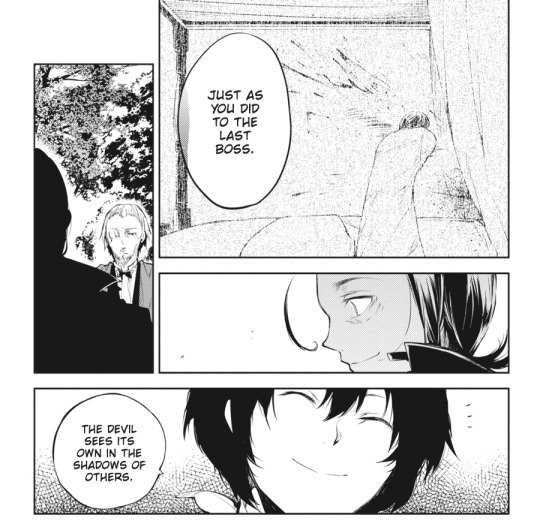
(notice the inclusion of Hirotsu in this scene. Remember that later, Hirotsu suggests that Dazai knows why Mori did what he did to overthrow the old boss, which, in my opinion, is both a proof of Dazai's support in Mori's goal, and a reminder to uphold it.)
One of my favourite parts of the Dark Era light novel is a small scene during the epilogue that was not adapted into the anime. This is two weeks after Dazai defected:
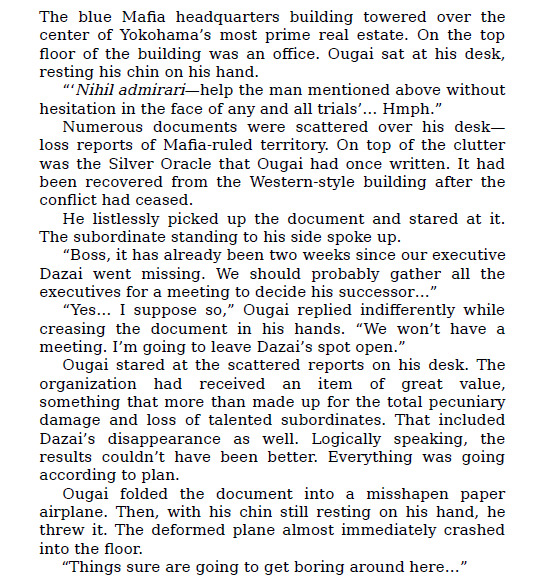
To quote Asagiri again, "Therefore, no matter how much your heart aches, you have to ignore your personal feelings." Mori is conflicted about the outcome of the Mimic incident. He holds in his hands the Silver Oracle he himself gave to Oda, and reflects on its purpose: to "help the man mentioned above without hesitation in the face of any and all trials". Didn't he fail to do just that with Oda? Didn't he set him up and sent him to his doom? Didn't he abandon him to his trial?
But he rationalizes the events by saying he got the permit they so badly needed. No matter if he sacrificed one of his men. No matter if he drove Dazai away. He accomplished his priceless goal. It was a total success.
And yet, he poorly folds a paper airplane with the very Silver Oracle he gave Oda, throws it, watches it crash immediately, and mourns the loss of his right-hand man, without ever moving on.
But we have a direct example of Mori expressing regret.

The perception that Mori in BEAST is a completely different character than Mori is in canon, when that perception doesn't extend to any other character from that universe, rubs me the wrong way. The characters in BEAST are very similar to their canon selves, with some core traits getting a new twist. They are all one or two major life changes away from becoming these versions of themselves. As far as we know, Mori's only life-altering event was being forcefully removed from the Port Mafia by Dazai, and secretly put in charge of Atsushi's old orphanage.

Mori unambiguously made that orphanage a better place, as stated by Atsushi himself. BEAST!Mori is a lot softer, vulnerable and honest. That Mori offers to be a father to Atsushi while he heals. He also expresses regret in not being able to help Dazai when he was in his care.
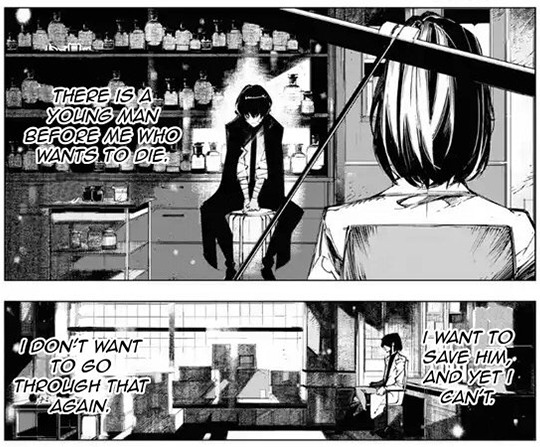
I think it's very interesting, especially when knowing that Asagiri wrote both BEAST and Fifteen at the same time for the Dead Apple movie, because in Fifteen we have this:

The beginning of the first chapter of Fifteen is a gold mine. It is narrated from Mori's point of view, the man of logic and calculations, and yet it is full of doubt. He is alone and struggling to fix everything with so many people against him. But, throughout this scene about grasping at the Port Mafia's power, there is also this secondary thought being woven in, of Mori having started to actually care for Dazai.
The teenager is scary to him, smart enough to be a threat should he decide to be done with all this and turn against him, and yet, he immediately (and with a hint of sadness) finds that Dazai reminds him of himself. This lonely, lonely man found a kindred spirit, bright enough to grasp any situation in seconds and prone to using an uncomfortable obsession to divert and keep you guessing his true intentions. Mori entered Mentor Mode™ then. He taught Dazai his ways, he shared his struggles and thought process, he fought tooth and nail to keep him alive.
So when he asked Dazai why he wanted to die, it was with the concern of someone who has started to care. It was with the mind of someone who is trying to prevent the worst by fixing the problem at its source.
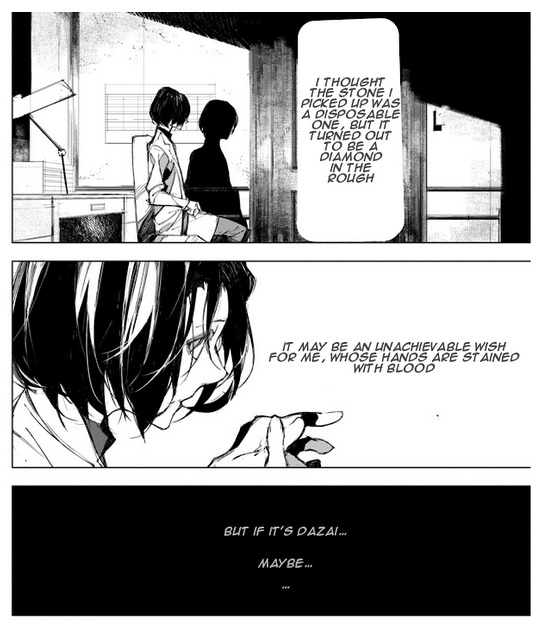
(translation: Reneray)
But it's also that self-projection/ability to relate that made him drive Dazai away, when he pushed too hard and forced Dazai to adhere to his optimal solution philosophy. Because Dazai cannot separate himself from his attachments, could not ignore his emotions like Mori does, and chose Oda over Mori's logic. From Dazai's point of view, that was betrayal. Mori and him were accomplices!
Dazai planted the idea that Mori was afraid of him taking over as boss, and Mori seems to agree with that thought (would it be because he feared for his life, or for Dazai's ability to replace him?) Yet, for a man afraid of his closest subordinate backstabbing him, he seems to be hanging on quite hard to the possibility of Dazai coming back, leaving his seat open to this day, inviting him back twice in the same arc, and...
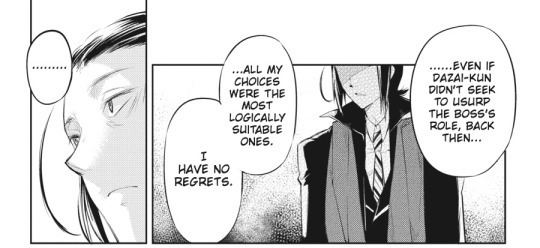
(yeah I used this picture at the start too. "I hAvE nO rEgReTs" he says)
Mori may try to convince himself he feels no regrets and no guilt over his own actions by weighting gains and losses objectively, but he still hurts and has a very hard time moving on. He's human despite his best efforts, prone to mistakes and doubts. He's lonely and wishes to impart his knowledge onto others. His cold logic has both helped him in fixing the city, and alienated him from some of the people he most cared about.
In a similar vein, should the ADA employee transfer be of topic again, and should Mori clash with Yosano again, I wish we get to see some similar conflicting emotions in Mori between the usefulness of Yosano's ability, and Yosano herself as a person. The war was 14 years ago, that's a long time, and I want to believe that counts for something.
#there carrot i finished it 4 u#i can't be normal about mori and i've been having Many Thoughts about him#i needed that out of my system and lost the plot twice so uh. I hope this reads somewhat fine.#i could have started on twelve different tangents i have SO MANY THOUGHTS ABOUT MORI#i love mori i'm not even going to excuse or justify myself read the post#bsd#bungou stray dogs#bungo stray dogs#bsd analysis#bsd meta#bsd mori#bsd mori ougai#bsd beast#bsd beast spoilers#apparently i talk sometimes#what does it mean about him trying to get yosano back all these years later now that she's a grown-up with the means to oppose him?#is it only about her ability? or did 14 years of hardships made him reflect in any way at all?#food for thought (while we wait to see if that plotline gets cancelled or goes anywhere interesting)
1K notes
·
View notes
Text
Current theory:
The whole dressing up like a vampire to trick Fyodor was actually Chuuya’s plan. Upon realizing Chuuya was in Meursault (and naturally knowing he was probably faking it), Dazai just rolled with it and implemented one of their old plans.
Because I think it’d be funny if the set-up was like —
Mori, finding Chuuya struggling to get the fangs in place: What are you doing?
Chuuya: Oh, Boss! Perfect timing. Help me get these on.
Mori: …Why.
Chuuya: You told me to get the Agency to safety and that stupid motherfucker got himself arrested and sent to France. I’ll need to infiltrate to get him and I figure I might as well make sure Fyodor dies while I’m there. I need to get back at him for the whole Cannibal thing.
Mori, thinking over the strategy: …And this is Dazai-kun’s plan?
Chuuya: Eh. He’ll know what’s going on when I get there and figure things out.
Mori: So he doesn’t know you’re coming?
Chuuya: He’ll know.
Mori: …
Mori, sighing: Let me get the glue.
Mori’s not gonna question it if he can get Soukoku on the playing field. He’s never understood their plans and he’s not going to start trying now.
#bsd#bungou stray dogs#bungo stray dogs#bsd spoilers#skk#soukoku#dazai osamu#nakahara chuuya#osamu dazai#chuuya nakahara#mori ougai#bsd s5#bsd theory#bsd analysis#bsd fanfic#my posts#my post#meta#my meta
866 notes
·
View notes
Text
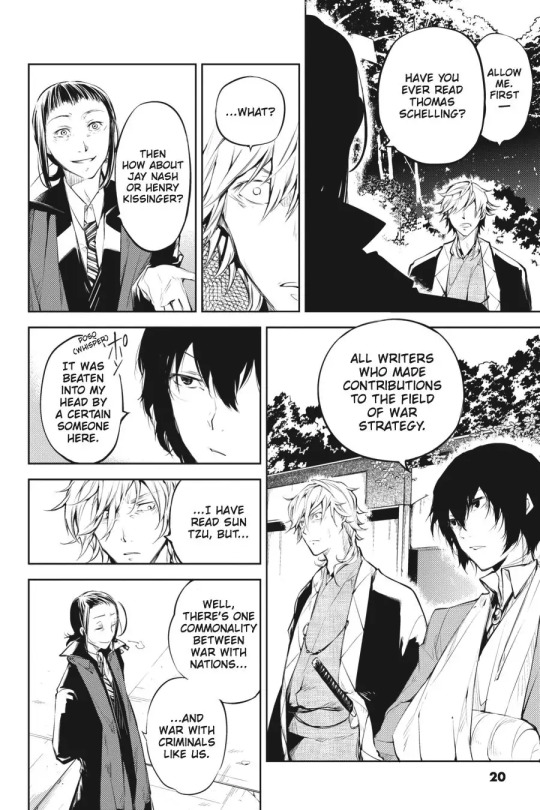
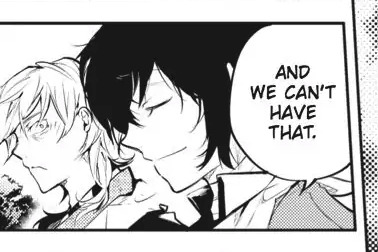
poor fukuzawa is soooo out of his element with these two???
there's no way between mori, dazai, and ranpo he doesn't feel like a stone cold dumbass like 75% of the time even though he'd otherwise be the smartest person in the room.
#bsd meta#(for organizational purposes)#i love that fukuzawa reads so much! he values education!#he looks so shooketh here because hes like 'I DONT KNOW WHO THOSE PEOPLE ARE AND I AM OUT OF MY DEPTH ABORT ABORT'#his self concept is so shitty that he just jumps to anxiety! ugh!#being reminded that you're the dumb one both in your current relationship and your past one ✌#fukuzawa...babe...they like you because you're kind AND hot AND smart! please love yourself!#vita.txt#fukuzawa#dazai#mori#fukumori#fukudazai#morizai#(again for organizational purposes)
652 notes
·
View notes
Text
It’s really funny we never know what happened between Never Again and Momento Mori. It’s so jarring the way the MSR scenes play out. One minute they’re in a silent stand off in their office, the next Mulder is bringing her flowers in the oncology ward and her face lights up when Scully sees him.
What was the conversation in between?!? The crazy thing with them that it is remotely possible that no conversation happened and all Scully had to do was say ‘can you meet me at the oncology ward’ and Mulder would drop everything and come; no questions asked and flowers in hand. I don’t know if that’s sweeter or not, but together they always seem more than the sum of their parts.
#txf meta#the x files#txf#msr#fox mulder#dana scully#never again#momento mori#random rewatch based on gifsets
122 notes
·
View notes
Text
I think another reason why I don’t like or trust Natsume is highkey lowkey because Fukuzawa did not agree to the whole Tripartide Plan beforehand. He didnt agree to becoming the opposite to the Mafia, something that could’ve been fatal for them both, Natsume decided that for him.

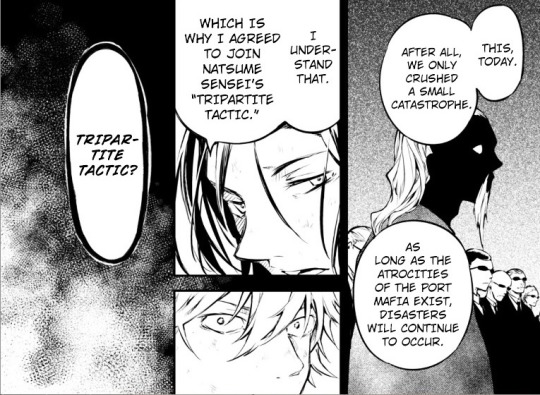
God knows how Mori met Natsume or why he decided that a murderous underground doctor with that ability was the perfect person to overthrow the notoriously dangerous Mafia but it wasn’t Mori’s plan.
Fukuzawa and Ranpo had their detective thing before they met Natsume and it was him that directed Fukuzawa to Mori. I’m of the opinion that Fukuzawa didn’t know that Natsume and Mori were planning for the latter to because the PM head until later on when Yosano comes into the picture when Mori’s already a member of the mafia.
In the chapter/flashback above he’s a quack doctor, 4 years after the Great War ends he’s officially in the Mafia, the ADA is official and Fukuzawa knows about the Tripartide, but he fiercely opposes the immortal regiment idea.
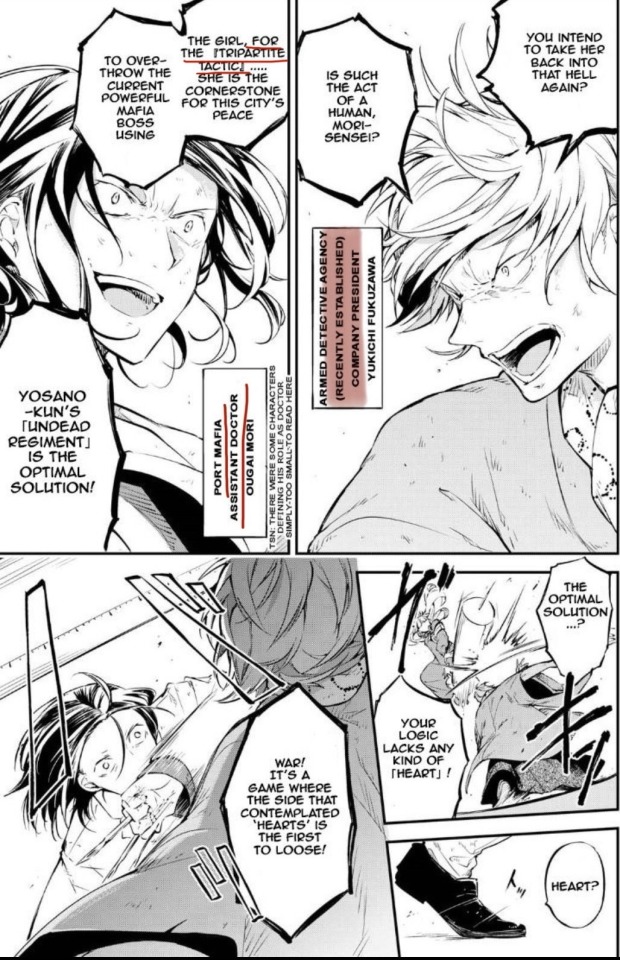
Sidenote: Somebody told Fukuzawa about Yosano’s whereabouts and what Mori was going to do with her. It was Mori who got her out of the room, it was Fukuzawa and Ranpo who intercepted them on the roof. Might’ve been Fukuchi, but that’s not been revealed and now he’s dead. My money’s on Taneda
Can you fucking imagine going to someone for a permission slip to run your detective business and the dude up and decides that you and your sixteen year old are the *perfect* people to oppose the Mafia in quasi-alignment with the government (who you previously killed for???)?????
Its likely that Natsume sent Fukuzawa to Mori bc he wanted the future ADA president and the future PM boss to have some idea of each other’s bloodlusts, strengths, personalities, convictions. But that makes him even shadier because its clear he knows Fukuzawa’s assassin past and whatever’s up with Mori. Also, why? Why make them go through the fake kidnapping thing together? Unless he was trying to forge some bond that would make it hard for them to go at each other’s throats in the future, eg: when Fukuzawa learns what Mori plans to use Yosano for. Because a diamond polishes a diamond.
The whole Tripartite Plan makes it so that the ADA, the government and the PM are in a permanent standstill because none of them can kill the other for fear of what would come next and Natsume executed it perfectly and shoved it onto Mori and Fukuzawa, the latter of whom this came straight out of left-wing and hit him like a freight train
#the mori+natsume dynamic are very very dazai+mori which hnnnnnng#and that says a lot about the three of them#with fukuzawa as chuuya i guess#in terms of the typical skk dynamics i guess natsume’s the bad mentor to mori which is understandable#bsd#bungo stray dogs#bungou stray dogs#fukuzawa yukichi#mori ougai#natsume soseki#tripartite tactic#santoka taneda#yosano akiko#port mafia#armed detective agency#special abilities division#bsd meta
128 notes
·
View notes
Text
The Assistant Book Seller
Edit 1 Dec 2023 - added missing information on the "ribbon pattern."
Edit: 3 Dec 2023 - correct information about middle pattern from creator
GABRIEL: Greetings! I'm Jim! It's short for James, but I don't need to keep telling everyone that. I'm an assistant book seller.
I'm sorry. Before I do anything else, I need to apologize for something I need to write further in. I didn't plan to write it, I just kind of bumped into it and, well, I can't ignore it. So...sorry. It's said. Forgive me for what needs to be done.
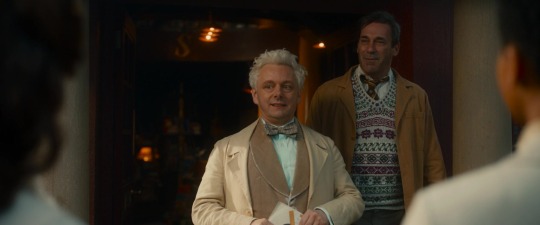
Although he arrived with nothing but a cardboard box and Rodney the Stunt Fly, Aziraphale made sure Jim was clothed in appropriate raiment while under his protection. We'll forgive him that he took a step back about, oh, fifty years or so to the 1970's, as Jim's overall look is a nod to the famous old sitcom "Open All Hours." So if he looks a little bit out of place, or, a little bit familiar, even, that's why.
While we are used to seeing angels in overcoats, it's Jim's vest that is the particular feature here. But I will take a moment to comment on the overcoat - not just the colour but its lapels. Aziraphale has obviously given him a colour with an earthly connection and one that indicate that he has bought Jim under his protection, but the lapels look quite neutral, with one up and one down. (Muriel is the same in their Inspector uniform, btw) This is the first indication they are between two things at the moment.
Onto the vest.
There is so, so much work and thought put into this vest! It was a one-off commission for the show, and the creator, Sandy Higgins, has said she is not allowed to give away the final design pattern. I have tried to contact her, and I'm waiting for a reply, so in the mean time I thought I would ask my keen knitter of a sister-in-law about one of the patterns I'm not sure about. "Well, that's Fair Isle knitting," she said, but she knew nothing about the individual line pattern I was interested in. Hmm, I kind of know that already, its in the notes that are guiding me for this meta, but hey, why not do a broader search and see what comes up?
So once I got back home I did. "Fair Isle knitting patterns" hmm...Wikipedia page for starters...what on *earth* is that at the bottom of the page...? YOU ARE. FRIKKING. KIDDING ME!!!!!!!

"See also: Gumbys"
oh ffs
I am so sorry that needs must make me mention Monty Python yet again, but here we are. And we must mention them, because this link is just too...unbelievably, deliciously good.
If you aren't familiar with the Monty Python catalogue, and don't recognize the mention of Gumbys, they were a set of characters that dressed and spoke in a certain way but the main points to take away were they wore woolen vests in the Fair Isle knitted style and their catch-phrase was - wait for it - "My brain hurts!"
I think we've heard that somewhere before?
CROWLEY: When you first arrived, you said you were here because they were planning to do 'Something Terrible' to you. So you remembered it then. Remember it now.
GABRIEL: It hurts to remember. My head isn't built for that.
Right. Now we've got that out of the way...back to the serious stuff.
The colours used in the vest are not your typical angel colours. There is a base of angelic off-white and there are some bits of purple for his royalty around the shoulder area - sometimes you need to look carefully for it. Otherwise it is dominated by vintage shades of red and green. Well. Who's an agent of change driven by love, then?
The horizontal stripe pattern is partly to remind us of the classic biblical robes with stripes that ran along them, much like the style of Crowley's black and red robe in the Job minisode, but is also part of the traditional Fair Isles pattern work. And each row only has two colours, but up around the shoulder area we do see purple start to sneak in as a third colour.
On to the incorporated symbols! I'm going to go from bottom to top.
On the lowest two we feature Crowley and Aziraphale. We have Crowley's demon satyr tail from the Good Omens logo on the lowest stripe - the double-headed arrow.
The next stripe is Aziraphale, with a variation of the classic OXO pattern ("hugs and kisses.") The X is meant to represent his angel wings, and the O is modified to mimic the "o" with a halo in the Good Omens logo. I've highlighted all three in the image on the right.
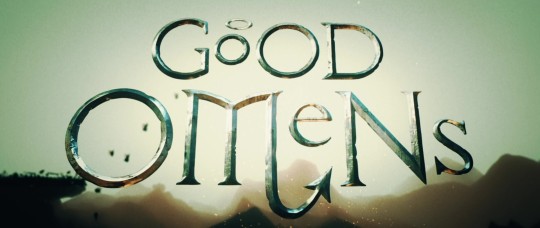
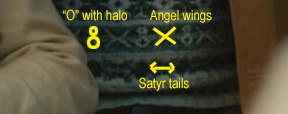
The third row up is a Sumerian Star pattern that represents one of the flowers associated with Gabriel, the lily. They are supposed to represent the purity of Mary, mother of Jesus, as he had one in his hand when he visited her during the Annunciation.
The row above that is what I believe to be a Byzantium pattern, and is included to show "an Angel's ability to be timeless."

The next three rows are still under a bit of a question mark as I write this. I plan to come back and edit it in if I find the answer.
The bottom of the three is the Duke of Buccleuch pattern, "to celebrate the long and necessary contribution that the cottage industry of hand knitted items."
The middle one - ? (perhaps you, the reader, know? It looks like a spiralling ribbon if I stand back, but that isn't sparking any connections, either.)
Edit: @noneorother tells me in a reblog (below) that this pattern represents the shoelace from the magic incantation Aziraphale uses "Banana Fish Gorilla Shoelace." So it is ribbon-like! This then points to the Second Coming, as it the shoelace references the end of the book, and the last paragraph of the book references Yeats poem "The Second Coming" as well as the novel 1984. To me it is then also telling us there is a cycle occurring, or a cycle that needs to be renewed. This fits in with some other clues other meta-writers have been picking up.
Edit 2: Turns out none of that was correct - I heard back from the creator herself and it's actually the double-ended satyr tail pattern again! It just seems to make a bit of an illusion of a ribbon or shoelace.

The pattern below is a modified OXO pattern.
The top one looks like two rams horns facing each other. A hollowed out rams horn can be used as a trumpet, and is known as a shofar in Jewish religion. Gabriel was traditionally known to carry a trumpet.


The ancient meander pattern would be recognized by most people, included as another classic timeless pattern found all over the world. For some it symbolizes eternity and endless flow.
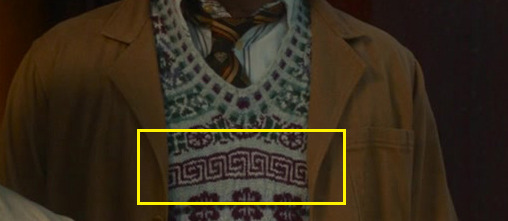
The wheels here appear to be Michael's ophanim wheels, that would have eyes around the rims.
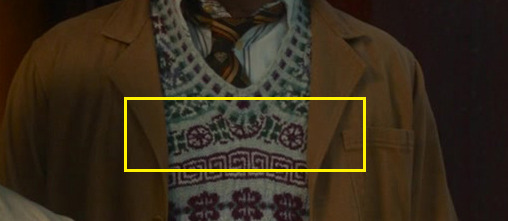
The hourglass is to remind us that time is running out. Memento mori - "Remember that you die." It is a major theme in both series.

Right up high, just before we lose the rest of the vest inside the overcoat, we get a glimpse of a large diamond-shaped icon. I wonder if this is another stylized set of angel wings, like we saw in the Job minisode on Aziraphale's golden collar.
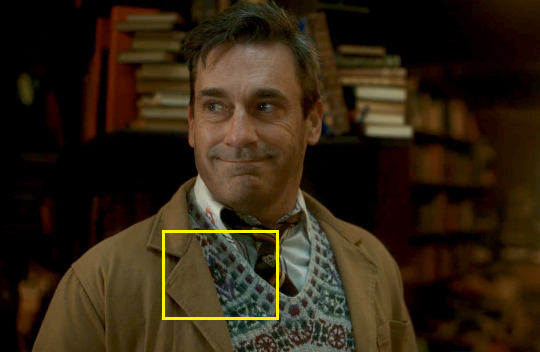
To finish off the outfit, he is wearing dark gray trousers with sneakers! I'm sure that's so he could keep sneaking up on Aziraphale in the shop, haha. His shirt seems a little too large for him and the tie is knotted too high and is not settled along his centerline. It's all at odds with his previous neat and sharp appearance as Supreme Archangel Gabriel.
I'd like to say a big thank you to @aduckwithears for helping me with information on the vest and finding the creator's other social media sites. You can see their two posts about it here and here.
#good omens#good omens 2#good omens meta#good omens analysis#aziraphale#gabriel#jimbriel#jim's vest#satyr tails#angel wings#halos#lily#meander pattern#rams horn pattern#hourglass#memento mori#open all hours#good omens costume meta#monty python#gumbys#my brain hurts!#fair isle
331 notes
·
View notes
Text
There is a cyclic tragedy inherent to Mori's character wherein he's actually a deeply lonely man, but it's mostly because his resolve to do morally reprehensible things and think of people as pieces on the game board is something he prioritizes over his relations with those very same people, and this inevitably pushes them away (for very understandable reasons). And it kind of sucks honestly because the most frustrating thing about Mori is that he 100% has the potential to be a fantastic teacher and mentor, and more than that, I think he loves it! Just look at Beast! But for as long as he decides he needs to be the one to make "the hard calls" to "preserve peace", then Mori will inevitably continue in this cycle of alienating all the people he has a fondness for.
I do feel as though Mori's loneliness is something he views as a necessary sacrifice that he is making for the greater good (and if he is so willing to sacrifice, then Dazai's unwillingness to do the same comes out of left field because - "what do you mean? you're supposed to be just like me!").
Anyways.
Mori voice: "I'm so alone"
Also Mori: *continues to prioritize pure logic over the emotions of his people and himself*
The people: *get rightly angry and/or become extremely traumatized and leave him*
Mori voice: "I did what needed to be done"
Mori: "..."
Mori: "..."
Mori: "I'm so alone"
Sir. You are doing this to yourself.
#thing is he works well as a mafia boss because those people who take orders know in advance they are going to be commanded#to do whatever is necessary#mori has cultivated strong bonds of loyalty so people like hirotsu and tachihara have no issue with doing what is demanded of them#since that is just what you do in the mafia.#but for people mori is closer with. his actions frequently feel like betrayal to them. because that may be how you treat a soldier#but it's not how you treat a child a mentee or a friend.#the thing i want to know is why he thinks being ruthless in the service of yokohama's peace is his own personal responsibility#in the first place#bsd#bsd mori#bsd meta#<- sort of. i'm mostly just rambling#storyrambles
290 notes
·
View notes
Text
Odasaku became to Dazai what he had hoped Mori would be to him
…what Dazai was to Akutagawa
…what Atsushi was to Kyouka & Lucy
…what Fukuzawa was to Ranpo
…what Ranpo was to Yosano
…what Mori & Adam were to Chuuya
…what Fyodor was to Nikolai
…what Fukuchi was to Teruko
…what Dazai was to Sigma
…what Natsume was to Oda
the bsd web of hope :’)
#ETA: what Mori was to Chuuya. & what Dazai was to Sigma#i was tempted to add what Aya was to Bram but idk if it’s exactly the same. definitely similar tho#the bsd brainrot is consuming me more than usual this morning#rambling about bsd again#bsd#bsd dazai#bungou stray dogs#dazai osamu#bsd meta#bsd chuuya#nakahara chuuya#bsd odasaku#bsd mori#bsd fukuchi#bsd fukuzawa#bsd atsushi#bsd kyouka#bsd lucy#bsd natsume#bsd nikolai#bsd fyodor#bsd ranpo#bsd yosano#bsd adam
153 notes
·
View notes
Text
Yosano and Dazai aren't like Mori because he took them into his care; he took them into his care because they were like him. Mori is to Yosano and Dazai, who the Azure King is to Kunikida, and who Verlaine is to Chuuya: someone they could become, and so consciously choose never to be.
Their contradictions aren't Mori's distortions of who they are or would have been; their contradictions are complements, without which they can't be whole. That death is inevitable renders consequential the decision to live; inflicting acute pain that's electric and writhing is euphoric when you used to deaden nerves by rinsing them of pain to prolong their overexposure.
Mori sees himself in them, and he tried to mold them. But Mori doesn't get credit for the worst in them, and Fukuzawa shouldn't get credit for the best in them.
192 notes
·
View notes
Text
I love how Bungou Stray Dogs writes Geniuses.
Dazai and Dostoyevsky are very obvious foils, but BSD never lets that feel lazy, because the two still have distinct ideologies and strategies. The line is less blurred with the two. Both are willing to kill, to manipulate and to utilise any means necessary to achieve their goals. In the script distinguish themselves majorly in one particular way, which is their understanding of God (or at least fate) and their perspective of humanity. Fyodor believes fate rewards perfection and harmony while Dazai posits that the works of destiny are happenstance and absurdity. Fyodor thinks he's controlling the situation while Dazai says the ones making the World move are the people trapped in contingency. They both agree that humans are sinful and foolish. But to Fyodor that makes them undeserving and boring, while Dazai says that their inherent flaws make them great. They aren't different in an intellectual level, only an ideological one.
Then compare than to Ranpo, noted as the strongest man in the agency. A kind of walking deus ex machina with Ultra Deduction, but a really complex character. We saw him as a strategist in Cannibalism, except that he largely was supporting Kunikida, but now he's essentially running all of the ADA operations. He fails to account for all the contingencies that Dostoyevsky would implement, but arguably knows the limitations and capabilities of the ADA better than even Dazai (think of that scene where they're planning to take down the moby dick).
I like how Ranpo and Dazai are portrayed in their respective arcs right now. Ranpo's strategies are explained clearly to the audience, with flashbacks to him explaining their route of action occurring as the plot unfolds, and clear agendas and techniques used in real time. In contrast, Dazai's plans are kept secret even from the reader, so we are left oblivious to his true agenda and plan.
Then compare that to Mori, who is a very grounded genius. He's smart enough to calculate that Fukuchi is Kamui, which before only Ranpo had deduced, and has been running the port mafia, even maintaining it during intense internal turmoil from when different factions were fighting against him. In the dark era we even see him out manipulate Dazai, with him being the one to smuggle Mimic into Yokohama and leak the location of the orphans without Dazai knowing. But he doesn't have aspirations beyond keeping Yokohama safe, so most of his schemes are directly for the city or for the Port Mafia. He utilises peoples access to information, and affects their circumstances to influence their actions. He has a great understanding of how individuals will both act and react, and how to manipulate both.
There are multiple 'genius' characters, but they all have distinct skill sets and ideologies, and I love seeing how the narrative handles each if them.
297 notes
·
View notes
Text
Mulder's Heart: Alluring Temptations, Denial, and the Slow Burn

In the novelization of Darin Morgan's episode War of the Coprophages (post here), Dr. Bambi Berenbaum is described as "the most beautiful woman that Mulder has ever seen" (loosely quoted, thank you @wonderxphile~.) The thought struck me that, perhaps, it's not an invention or interpretation of the novelist's so much as an offshoot of the root of Mulder's romantic inclinations-- specifically, ones that relate to his self-imposed celibacy.
During the early years of the show, David Duchovny described Mulder's choice to remain single in a particularly singular way: that Mulder was so dedicated to his work that any relationship or life outside of it would feel like cheating. As intriguing as that thought is, another crops up: if that be the case, why was he almost drawn off-course by various women on the show?
THE DESIRE OF THE EYE

All but one of Mulder's short love interests are narratively sexual characters. Phoebe Green and Diana Fowley were exes, both intending to seduce, distract, and control his focus away from the mission. Kristen Kilar and Bambi Berenbaum were two beautiful women that drew and attached his eye immediately. Lastly, Melissa Rydell was a bit of an outlier who still exuded the same pull as the other four: a commonality with Mulder-- one who "understood" him in ways other women hadn't (or wouldn't.)
If his work is his wife, then they are his (potential) mistresses.
Mulder fell hard and fast; but snapped out of his rose-colored fog just as quickly. Each woman didn't withstand the test of his work, always turning their back on him for someone else, someone "greater."
Except for Dana Scully.
SLOW BURN AND DENIAL

The difference between Scully and the other women was that she didn't knock Mulder's socks off at first sight: baggy suit, green haircut, cutting science, and fire-breathing accountability challenged and won his trust before it won his heart.
Be that as it may, within two episodes Mulder had very, very quickly shifted his estimation of Scully from spy to maneuverable hindrance to partner.
By Squeeze he was undeniably, irrevocably territorial. While he respected her decision to leave, he would most certainly have continued tracking her down wherever she was working to discuss details of his case, her case, or any tidbits in-between (as depicted by him interrupting her stakeout.)
Season 2 beat Mulder over the head until he realized how closely he tied Scully to the work. In Little Green Men, he needed her encouragement to combat self-doubt; but more importantly, he needed her there with him, by his side. After her abduction in Ascension, he became listless, self-destructive (@cecilysass's excellent meta here), and dispassionate for the work: there was no curiosity or joy of discovery in 3's case-- in fact, there was no joy at all. In One Breath, he tried to barter his life's work for Cancer Man's location, resigning anyway out of sheer guilt. (Later, he tried to sell his soul again, more directly, to save Scully's life in Memento Mori.) By Firewalker, Scully had already eclipsed the work-- which Mulder didn't acknowledge, to her or himself, until Fight the Future-- and he frequently abandoned leads or "the truth" if he thought her life were in danger. Although she had become indispensable, Mulder didn't realize he loved her until later in the narrative.
Still.
Scully acknowledged her feelings, indirectly, at various times through the series; but he only initiated when afraid she'd leave, forever. While genuinely blinded by his quest, Mulder wasn't stupid. Scully fishing for his genetics in Home led him to banter away the conversation, later fixing a chair firmly under the broken lock separating their rooms. Scully bringing a cheese platter to celebrate in Detour didn't grab his attention from the mystery, but it underscored his efforts to deflect her serious topic later in the forest.
Because, at the heart of the matter (the very place he tried to avoid), Mulder lived in bone-deep denial.
In E.B.E., he quips, "I think it's remotely plausible that someone might think you're hot"; in Irresistible, he fumes over no one noticing where "a pretty woman" went; even in A Ghost That Stole Christmas he huffs, "We're not lovers." Maggie Scully ascertained his feelings immediately in Ascension, and Melissa Scully pushed him to acknowledge them in One Breath: "At least she'll know. And so will you." During the cancer arc, he embraces Scully for never giving up, doesn't discuss her cancer unless absolutely necessary, freely offers affection on her deathbed; then after, tries to deflect a personal talk in the woods while in shock. Even thoughts of harm coming to his partner-- be it not wanting to consider Scully possibly dying in Piper Maru or the split second of doubt despite evidence when she did "die" in Kitsunegari-- throws up an instant wall of denial.
Mulder knew something was "there" after Melissa Scully made him confront himself-- in fact, he likely already sensed something during his conversation with Scully in Tooms-- but he didn't want to poke around to find out exactly "what" it was. He wasn't ready.
Yet.
"FOX " OR "MULDER"

The women closest to Mulder ended up calling him "Fox" (or "Sullivan")... all except Scully, his abandoned lunch colleague in Little Green Men, and the phone sex operator in Small Potatoes.
Scully herself is an even more isolated case, of course.
When she began to make a personal confession in Tooms, Mulder uncomfortably laughed off her "Fox...": "I even made my parents call me 'Mulder'. So. 'Mulder'." Perhaps that's true (or perhaps not, since his father and mother also called him "Fox.") Regardless, he sensed Scully was letting her guard down; and, fearing she was opening her heart in another direction, tried to fend off any loving regard. Scully surprised him, however: "Mulder, I wouldn't put myself on the line for anyone but you" incorporated his preference, expressed her loyalty, and was a far cry from a lovesick oath. He teased the moment away, pleased; then was, by turns, caught, unsettled, and relieved by her teasing repartee.
From that point, his name began to change from professional shield to personal endearment.
But what does this have to do with Mulder's mistresses?
SCULLY, HIS LIFE

Scully was inextricably linked with the work after her return; and, whether Mulder had fully accepted his love for her yet or not (and I'm beginning to think he hadn't fully until her cancer diagnosis), she was now his life. Drawing her away from a "normal life" and dragging her dog along on a lake monster excursion became an expected, routine part of his weekend.
Bambi-- the "most beautiful woman"-- appeared during this chummy, Season 3 phase. When larger questions and greater fears shook stability from under his feet, Melissa Rydell-- the alleged soulmate-- made her (apparently) destined entrance.
Both women fell into a pattern Phoebe and Kristen set: bold, shiny new possibilities; then solace-seeking and grasping insecurity. That pattern, however, was broken during the cancer arc, as exemplified by the exception to this general rule: Diana Fowley.
ESCAPING THE SNARE OF THE FOWLER

Phoebe, Kristen, Bambi, and Melissa effortlessly lured Mulder's focus from his own aims. Not permanently; just enough to create a foil for the work-- a.k.a. Scully. Mulder suffered a few burns from his false romances (post here): passing out from smoke inhalation, watching three buildings go up in flames, and being dismissed from the life of each romantic interest. Diana, too, betrayed him; and Diana, too, was tied to the blaze in his office.
However, Agent Fowley was not sought after like her predecessors. She was also the first to notice a change in Mulder.
When she arrived on the scene, boldly hitching her wagon to his theories and his work, she expected him to readily accept, nay beg, her back on the files. Instead, Mulder laughed off her concerns about Scully, gushing over his new partner's innate ability to make him "work for it." Further, he stuck by Scully's side when his ex was hospitalized, only straying in The Beginning when Diana created an elaborate ruse to separate the two. He didn't initiate or reciprocate her kiss in One Son; and he was more baffled than beaming when "she" wanted to play domesticly-ever-after in Amor Fati. In short, Mulder was not drawn romantically to Diana, at all: in fact, he was wary. Friendly, but distant.
She'd missed her chance.
If Diana had swooped in sometime before Memento Mori's unification, she could have exploited the gnarly feeling that had been building since early Season 4, or widened its distance post Never Again-- a distance that had been building since Mulder's sloughed-off remark in Home and unwitting partner replacement in The Field Where I Died. (More accurately, if CSM had bothered to pay close attention to his lab rats, he'd have noticed a weakness in their partnership and sent in his super rat to exploit it.) As it happens, she did not.
MULDER'S HEART

What does this mean for Mulder and Scully?
At the outset, I believed Mulder learned the depth of his love for Scully during the events of One Breath-- now, however, I'm convinced that's only half true.
Scully had already replaced the work's importance in his life, but neither understood the depths of his reliance on and devotion to her. Mulder was still gut-reacting, not wanting to delve too deeply into his heart to find the truth there. Never Again gave him a great and terrible shakeup because he'd taken Scully's place at his side for granted-- he'd thought "This work is my life" also extended to her; and that she'd glanced at his offer and was preparing to reject it. Mulder was living in full-blown denial: denial so deep that only the incurable, inescapable possibility of her death could tear his blinders off.
After her remission, that denial was blown to pieces; and, afraid to face the ramifications of his realization and her Redux II-Detour acceptance of it, he kept fleeing. As Scully says in Dreamland I, "We, we just keep driving."
That brings us back to Phoebe Green-- dangerous allure-- and Kristen Kilar-- mutual mourning partner-- and Dr. Berenbaum-- the "most beautiful woman"-- and Melissa Rydell-- tortured twin soul-- and Diana Fowley-- ancient history. His heart was free in Fire, unconsciously grieving in 3, charmingly in denial in War of the Coprophages, seeking Scully in other lives in The Field Where I Died, and beating only for her in The End.
CONCLUSION

A very interesting, complicated man, indeed.
Thanks for reading~
Enjoy!
#txf#xf meta#meta#mine#DD#quotes#Phoebe Green#Diana Fowley#Bambi Berenbaum#Kristen Kilar#Scully#Melissa Rydell#S1#Fire#Pilot#Ascension#S2#3#One Breath#S3#War of the Coprophages#S4#TFWID#Memento Mori#Redux II#S5#Detour#The End#FTF#The Beginning
112 notes
·
View notes